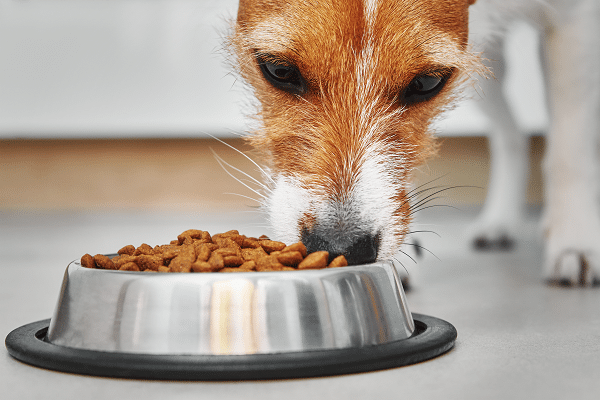Maintaining a healthy weight is as crucial for dogs as it is for humans. This essential aspect of dog health is sometimes overlooked, leading to a multitude of preventable health issues. Obesity in dogs can lead to problems such as joint pain, heart disease, and a reduced lifespan. The goal of this post is to equip you with practical and effective weight management tips for your furry friend, which can help ensure they stay healthy and live a long, happy life.
Contents
Grasping The Severity Of Canine Obesity

Canine obesity is a state where a dog’s weight is 20% or more than the ideal weight for their breed and size. This condition can significantly impact their quality of life, making it more difficult for them to partake in everyday activities and increasing their risk of various health problems.
Common reasons for obesity in dogs often revolve around overeating and a lack of regular, appropriate exercise. However, other factors such as breed predisposition, underlying medical conditions, and certain types of medications can also contribute to weight gain. Understanding these factors is vital to effectively manage your dog’s weight.
Assessing Your Dog’s Weight

Recognizing whether your dog is overweight is the first step towards managing their weight. This is not always easy to determine just by looking at them, especially with furry or muscular breeds. However, you can perform a simple check by feeling their ribs. If you can’t easily feel your dog’s ribs with a light touch, your dog might be overweight.
Notably, dogs come in various sizes and breeds, each with different standards for what constitutes a healthy weight. Age also plays a significant role in weight changes. For an accurate assessment, consider seeking advice from your vet. They can provide a comprehensive weight evaluation and guide you on your dog’s ideal weight.
Balanced Diet For Dogs

The foundation of weight management in dogs lies in providing a balanced diet. This includes considering the type of food, quantity, and feeding schedule. Feeding your dog a diet rich in proteins, fiber, and certain fats and low in simple carbohydrates can help maintain a healthy weight.
Portion control is also essential. Overfeeding is a common problem, even with high-quality dog food. It’s not just about what you feed your dog but also about how much and how often. Again, a vet or a canine nutritionist can provide valuable guidance on formulating the right diet plan for your dog.
The Role Of Regular Exercise

Exercise plays a crucial role in managing your dog’s weight. Regular physical activity helps burn off extra calories that would otherwise be stored as fat. Moreover, exercise helps build lean muscle, which is beneficial for metabolism, as muscles burn more calories at rest compared to fat. And while exercise is vital, finding a balanced routine that fits your dog’s breed, size, and age is essential.
For example, smaller breeds may require more frequent but shorter bursts of exercise, while larger breeds might benefit from longer, more strenuous sessions. Some dogs may also enjoy specific activities like fetch, swimming, or agility training. It’s all about finding what your dog loves and what suits their individual needs.
Limiting Treats

While giving your dog treats might feel like a way of expressing love, it can unknowingly contribute to their weight gain. Many commercial dog treats are high in calories and unhealthy fats. Even if the treats are small, these extra calories can add up over time, leading to weight gain.
Consider opting for healthier treatment alternatives. For example, you can use low-calorie vegetables like carrots or cucumbers. Another useful strategy is to portion out your dog’s daily food allowance and use part of it as treats throughout the day. This way, you’re not adding extra calories to their diet but rather distributing their daily intake differently.
Regular Vet Check-Ups

Regular vet visits are key in managing your dog’s weight. A vet can provide a comprehensive health check, including assessing any weight gain and related health issues. Additionally, your vet can guide you in making necessary adjustments to your dog’s diet and exercise plan.
It’s also important to remember that weight gain in dogs can sometimes be a symptom of underlying health issues. Conditions such as hypothyroidism or Cushing’s disease can lead to weight gain despite proper diet and exercise. Regular vet visits ensure these conditions are diagnosed early and treated appropriately, preventing unnecessary weight gain.
Weight Management For Special Cases

Some dogs may have unique weight management needs due to their age, breed, or health conditions. For instance, older dogs may have slower metabolisms and lower energy levels, requiring fewer calories compared to younger, more active dogs. Similarly, some breeds are genetically predisposed to obesity and might require special dietary considerations.
If your dog has health conditions like arthritis, heart disease, or diabetes, these can also affect their weight management. These dogs may require specialized diets or modified exercise routines to maintain a healthy weight. Always work closely with your vet to develop a weight management plan that caters to your dog’s specific needs.
The Role Of Owner’s Commitment

As a dog owner, you play a pivotal role in your dog’s weight management. It’s up to you to provide a balanced diet, regular exercise, and limited treats. However, weight management is not a one-time event; it requires consistency and commitment over time.
One of the challenges is managing your dog’s begging behavior without giving in to guilt-feeding. Another challenge is keeping yourself motivated to provide regular exercise, especially on those busy or lazy days. Remember, managing your dog’s weight is not just about their physical health but also about enhancing their overall quality of life and longevity. It’s a commitment worth making.
Weight Management For Dogs Is Vital!
Managing your dog’s weight is an integral part of ensuring their long-term health and happiness. It requires a balanced diet, regular exercise, controlling treatment intake, and routine vet check-ups. While there may be unique challenges for different breeds, ages, or health conditions, the core principles remain the same. As a committed dog owner, your efforts can make a significant difference in your dog’s life. Embrace the journey and remember that every step you take towards weight management is a step towards a happier and healthier life for your furry friend.


